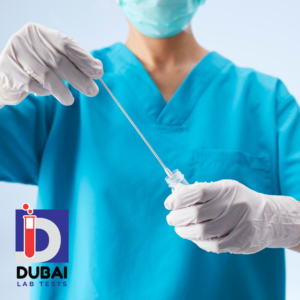Enteropathogenic E. coli (EPEC)
د.إ210.00
Sample Type : Stool
Methodology : Agglutination
TAT : 2 Days
Description
**Enteropathogenic E. coli (EPEC) Lab Test**
The Enteropathogenic E. coli (EPEC) lab test is a specialized diagnostic tool designed to detect the presence of EPEC bacteria in stool samples. EPEC is a significant cause of gastrointestinal infections, particularly in children and immunocompromised individuals. This test plays a crucial role in identifying the root cause of persistent diarrhea and other gastrointestinal symptoms, enabling timely and effective treatment.
### Why You Need This Test
The Enteropathogenic E. coli (EPEC) lab test is essential for diagnosing infections caused by EPEC, a pathogenic strain of Escherichia coli. EPEC infections can lead to severe gastrointestinal distress, particularly in vulnerable populations such as young children, the elderly, and individuals with weakened immune systems. Early detection through this test allows healthcare providers to prescribe targeted treatments, reducing the risk of complications and preventing the spread of infection. This test is particularly important for individuals experiencing prolonged or severe diarrhea, as it helps differentiate EPEC infections from other causes of gastrointestinal issues.
### Symptoms That Indicate This Test
You may need the Enteropathogenic E. coli (EPEC) lab test if you are experiencing the following symptoms:
– Persistent or severe diarrhea
– Abdominal pain or cramping
– Nausea and vomiting
– Loss of appetite
– Dehydration symptoms, such as dry mouth, fatigue, or dizziness
– Fever accompanying gastrointestinal symptoms
This test is also recommended for individuals who have recently traveled to areas with poor sanitation or have been exposed to contaminated food or water, as these are common sources of EPEC infections.
### Natural Production
EPEC is not a naturally occurring part of the human gut microbiota. Unlike non-pathogenic strains of E. coli that reside harmlessly in the intestines, EPEC is an external pathogen that enters the body through contaminated food, water, or contact with infected individuals. Once ingested, EPEC attaches to the intestinal lining, disrupting normal gut function and causing inflammation. Factors such as poor hygiene, inadequate food handling, and compromised immune systems can increase the risk of EPEC infection.
### What Happens If Untreated
If an EPEC infection is left untreated, it can lead to serious health complications, particularly in vulnerable populations. Prolonged diarrhea can result in severe dehydration, electrolyte imbalances, and malnutrition. In extreme cases, untreated EPEC infections may lead to kidney damage or systemic infections, which can be life-threatening. Early diagnosis through the Enteropathogenic E. coli (EPEC) lab test is critical to prevent these complications and ensure a full recovery.
### How to Prepare for the Test
Preparing for the Enteropathogenic E. coli (EPEC) lab test is simple and straightforward:
– Collect a fresh stool sample in a sterile container provided by the lab or healthcare provider.
– Avoid using antibiotics, antidiarrheal medications, or probiotics before the test, as these may interfere with the results.
– Follow any specific instructions provided by your healthcare provider or the testing facility.
No fasting or additional preparation is required for this test.
### Test Overview
– **Sample Type**: Stool
– **Methodology**: Agglutination
– **Turnaround Time (TAT)**: 2 Days
The Enteropathogenic E. coli (EPEC) lab test uses advanced agglutination techniques to accurately detect the presence of EPEC bacteria in stool samples. Results are typically available within two days, allowing for prompt diagnosis and treatment.
### Call to Action
Take control of your health today by booking the Enteropathogenic E. coli (EPEC) lab test. Whether you’re experiencing symptoms or seeking peace of mind, this test provides the answers you need to safeguard your well-being. Don’t wait—buy your lab test online now or search for a “diagnostic test near me” to get started. Early detection is the key to effective treatment and a healthier future.
**Category**: Microbiology




Reviews
There are no reviews yet.